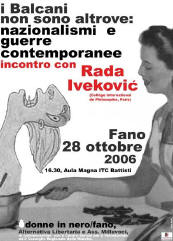
An Evening with Rada Iveković

On 28th October 2006 in Fano (Marches region of eastern Italy) there was an evening with the philosopher Rada Iveković (from the Collège International de Philosophie - Paris, Université St-Etienne). The event was entitled "The Balkans are nowhere else. Contemporary forms of nationalism and war" and was organized by the Alternativa Libertaria association together with the Fano Women in Black and the Millevoci association.
In a packed hall, Rada Iveković explained some of the communitary and nationalist dynamics that led, in various situations, to the separation between India and Pakistan, to the wars in Yugoslavia, to the creation of divisions within present-day societies, through the mechanism of multiple separations that are at one and the same time cultural, political and economic.
Iveković analysed in depth the divisions in French society between different generations of immigrants on the one hand and non-immigrant French or second-generation immigrants on the other. She also spoke on the divisions between men and women within French immigrant communities.
At the centre of Iveković's talk was a reflection on the progressive balkanization of French society which emerged in the revolt of the banlieues in 2005. Iveković underlined the fact that this was a revolt by young males from the city outskirts, which was the latest outburst in a long wave going back as far as the marches by young Muslim girls throughout France in 2003, when these girls and women were demanding greater freedom and emancipation than their patriarchal communities allowed.
Iveković pointed out that it was necessary for there to be post-colonial, feminist political reflection in order to understand phenomena of this sort, which French politics has not only failed to understand, but also exacerbated with certain authoritarian decisions such as the famous anti-veil law, which led to rebellion within communities and restricted freedom of movement for young women who instead wished for greater control over their own futures.
The talk given by Rada Iveković was particularly informative and provided a great deal of food for thought. Public interest was high and there were a great many questions from the audience, leading Ivekovic to deal with complex questions such as Europe's responsibilities in relation to internal nationalist dynamics in European countries and the geo-political effects on Europe's fringes - the ex-USSR, the Middle East and the Balkan peninsula. The event lasted over three hours, but the audience was rewarded with an extremely satisfying evening, thanks to the philosophical and political weight of Rada Iveković's talk.
M.A.
FdCA - "Nestor Makhno" Branch, Fano/Pesaro.